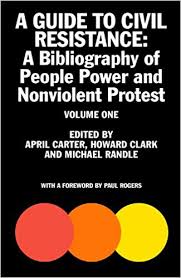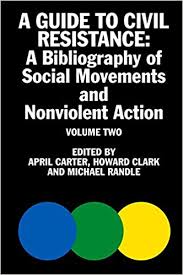If you’re an activist, student or researcher with an interest in nonviolence and civil resistance, here’s a site you’ll probably find useful.
CivilResistance.info is an independent website that is
maintained by people committed to opposing war and all forms of injustice, and promoting understanding of nonviolence and nonviolent social change.
It collates key resources and developments in nonviolent and civil resistance movements, past and present.
The background
In 2006, Housmans in London published People Power and Protest Since 1945: A Bibliography of Nonviolent Action, which was edited by Michael Randle, April Carter and the late Howard Clark. Howard Clark also set up CivilResistance.info and made the work available there.

People Power and Protest Since 1945: A Bibliography of Nonviolent Action
The book was later updated and expanded and published in two print volumes as A Guide to Civil Resistance (Merlin Press, London):
- Volume one: A Bibliography of People Power and Nonviolent Protest (2013) – nonviolent movements to bring about fundamental political change since 1945 (e.g. overthrowing dictatorships), plus relevant theory and historical context.

Volume one: A Bibliography of People Power and Nonviolent Protest
- Volume two: A Bibliography of Social Movement and Nonviolent Action (2015) – major social movements over a similar period: green, anti-war, feminist, LGBT+ and more, with an emphasis on nonviolent action and protest.

Volume two: A Bibliography of Social Movement and Nonviolent Action
The goal was to create a substantial set of literature on civil resistance in all its forms and to familiarise more people with the tools of nonviolent resistance and their potential to change our world.
Recently, to better meet the needs of modern activists and others, Andreas Speck (former coordinator of War Resisters International) added all the content of the Guide, plus other relevant material, to CivilResistance.info so that it is searchable and easily updated.
Silvia de Michelis is currently the Support Worker for the project.

Silvia de Michelis
Silvia – what does your work involve?
I started in October 2017, and it’s my job to amend the website – updating it based on April’s and Michael’s suggestions, following up proposals to add new sections, for example on the Black Lives Matter movement, recent events in Catalonia and Burma, and abortion rights in Spain.
How does it help activists to have this information online?
It’s more user-friendly and up to date – it’s inclusive of what’s happening at the moment, of criticism of movements and the latest developments. It covers the historical context and it can be used for academic research, but it’s also useful for current activism.
Our resource is less immediate than social media and other media outlets because items are only included when something substantial has been written about a movement or an issue – when there are several references to draw on. This means our content has a slight reflective distance that social media and mainstream media might not offer.
Transferring from the paper version to digital means we can update it as current events unfold, and it’s more economically sustainable, so we can keep up with civil resistance tools as they develop.
Where can activists find the information?
All the original content from the print volumes is now online and being added to. There are search tools to help people find particular topics – for example, if you go to the bibliography page, you can search by author or country.

Bibliography search at CivilResistance.info
How did you come to take on this role?
I heard about the role via my PhD supervisor. I’m doing a PhD in Media and International Relations, which has no direct relation to civil resistance but I was interested because ethically and practically I would like to see civil resistance movements growing, as well as a broader and more informed discourse about them at the mainstream level.
Working within Peace Studies is also a reason for wanting to be involved! I’m a member of a Buddhist NGO called Soka Gakkai International (SGI), which plays a big role in my life as I explore more how to contribute to building a peaceful society, both professionally and as a citizen.
I’ve also worked for a non-profit organisation in Italy – my country of origin – called the Sereno Regis Centre for Peace and Environment Studies. My role was to contribute to their media output, producing materials on peace journalism or translating articles to go on their website that dealt with conflicts and post-9/11 foreign interventions.
All of this has reinforced my understanding that web content is a really important way of reaching people and informing them about nonviolent forms of civil resistance, and getting them to consider these as feasible ways of dealing with conflicts.
What other projects have you been previously been involved in?
The NGO I mentioned, SGI, globally sustains projects on the role of civic society, the nuclear weapons ban and so on – all types of project, including at UN level. For example, see the People’s Decade for Nuclear Abolition.
Thanks, Silvia!
Michael Randle, one of the editors of the Guide, is also a Commonweal trustee, and he told us a little more about how the current project came into being and what the future might hold for it:

Commonweal trustee Michael Randle
The project was initially funded by the Joseph Rowntree Charitable Trust (JRCT) and the Washington-based International Center on Nonviolent Conflict (ICNC).
Funding from JRCT and the Network for Social Change is paying for a PhD student (Silvia) to work on the project part-time for an initial period of three years, with technical support from the ethical web development company Netuxo.
The hope and expectation is that work will continue beyond the initial three-year period and that Peace Studies and the University of Bradford will provide an institutional base for the project in the future.
Check out the online Guide to Civil Resistance at CivilResistance.info.
Search the bibliography.
Follow the site’s links to key peace and nonviolence organisations.